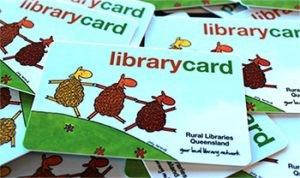Romancing the Library Card
By administrator | 21 August 2017
Do remember how special it was when you received your first library card? My first library card was made of white cardboard and the librarian typed my name on it using a typewriter at the Rockdale Municipal Library.
Library cards hold a romantic appeal for many of us. A look at the hashtag #firstlibrarycard on social media demonstrates stories, photos, and excitement about the milestone of receiving one’s first library card. No matter what your age, getting your #firstlibrarycard makes you part of a community, they are symbolic of belonging, and they come with benefits and responsibilities.

‘Where is the Green Sheep?’ on a Rural Libraries Queensland kids only library card
For children, a library card can be their first entry to membership in grown-up society - as individuals independent of their families. Library cards can represent belonging for adults as well. For new immigrants, a library card may be the first material sign of membership in their wider new community.
Libraries have led library card campaigns for years. Last year, SLQ negotiated with famous Australian illustrator Judy Horacek and leading author Mem Fox to use an image from 'Where is the Green Sheep?' on a Rural Libraries Queensland kids only library card. Other Queensland library services with kids’ only cards include Noosa, Sunshine Coast, Brisbane City and Tablelands.
Why is a personal library card important for kids?
- It's the first card bearing their name that they can carry in the community
- Young children begin a lifetime of library habit
- Kids are collectors – fast food restaurants and big supermarkets know that! Changing card design enables kids to collect the set as they grow
here
Comments
Your email address will not be published.
We welcome relevant, respectful comments.